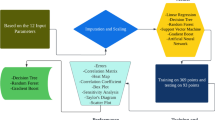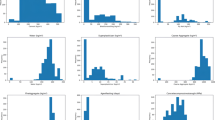Abstract
Determining the mechanical properties of plastic concrete samples through experimental investigation is costly and time-consuming. This research used supervised machine learning (ML) techniques, including Decision Tree (DT), Random Forest (RF), Gradient Boost (GB), Extreme Gradient Boost (XGBoost), Support Vector Machine (SVM), and K-Nearest Neighborhood (KNN) for predicting the compressive strength of the plastic concrete samples considering different values of cement, water, water-to-cement ratio, bentonite, temperature, and sand. The models' performances are compared and evaluated using the correlation of coefficient (R2) score, Mean Absolute Error (MAE), Mean Square Error (MSE), and Root Mean Square Error (RMSE). According to the results, the DT model was more effective in predicting with R2 = 0.87. In addition, a sensitivity analysis was carried out to determine each parameter's contribution level in implementing models using the RF algorithm. Consequently, it was shown that ML techniques are valuable tools for predicting the mechanical properties of plastic concrete in a more time and cost-effective way compared to laboratory tests.






Similar content being viewed by others
Data availability
The data can be provided upon request to the corresponding author. The corresponding author will be able to forward the data.
References
Ahmad, A., Ahmad, W., Aslam, F., & Joyklad, P. (2022). Compressive strength prediction of fly ash-based geopolymer concrete via advanced machine learning techniques. Case Studies in Construction Materials, 16(August 2021), e00840. https://doi.org/10.1016/j.cscm.2021.e00840
Ahmad, A., Ostrowski, K. A., Maślak, M., Farooq, F., Mehmood, I., & Nafees, A. (2021a). Comparative study of supervised machine learning algorithms for predicting the compressive strength of concrete at high temperature. Materials. https://doi.org/10.3390/ma14154222
Ahmad, W., Ahmad, A., Ostrowski, K. A., Aslam, F., Joyklad, P., & Zajdel, P. (2021b). Application of advanced machine learning approaches to predict the compressive strength of concrete containing supplementary cementitious materials. Materials. https://doi.org/10.3390/ma14195762
Alencar, D., Carvalho, D., Koenders, E., Mourão, F., & Rocha, L. (2017). Devising a computational model based on data mining techniques to predict concrete compressive strength. Procedia Computer Science, 108, 455–464. https://doi.org/10.1016/j.procs.2017.05.018
Amlashi, A Tavana, Ghanizadeh, A. R., & ... (2020). Develo** three hybrid machine learning algorithms for predicting the mechanical properties of plastic concrete samples with different geometries. AUT Journal of Civil 4(1), 37–54. https://ajce.aut.ac.ir/article_3335.html
Amlashi, A. T., Abdollahi, S. M., Goodarzi, S., & Ghanizadeh, A. R. (2019). Soft computing based formulations for slump, compressive strength, and elastic modulus of bentonite plastic concrete. Journal of Cleaner Production, 230, 1197–1216. https://doi.org/10.1016/j.jclepro.2019.05.168
Ashrafian, A., Shokri, F., Taheri Amiri, M. J., Yaseen, Z. M., & Rezaie-Balf, M. (2020). Compressive strength of Foamed Cellular Lightweight Concrete simulation: New development of hybrid artificial intelligence model. Construction and Building Materials, 230, 117048. https://doi.org/10.1016/j.conbuildmat.2019.117048
Chopra, P., Sharma, R. K., Kumar, M., & Chopra, T. (2018). Comparison of machine learning techniques for the prediction of compressive strength of concrete. Advances in Civil Engineering. https://doi.org/10.1155/2018/5481705
Ghanizadeh, A. R., Abbaslou, H., Amlashi, A. T., & Alidoust, P. (2019). Modeling of bentonite/sepiolite plastic concrete compressive strength using artificial neural network and support vector machine. Frontiers of Structural and Civil Engineering, 13(1), 215–239. https://doi.org/10.1007/s11709-018-0489-z
Gregori, A., Castoro, C., & Venkiteela, G. (2021). Predicting the compressive strength of rubberized concrete using artificial intelligence methods. Sustainability (switzerland). https://doi.org/10.3390/su13147729
Hadzima-Nyarko, M., Nyarko, E. K., Lu, H., & Zhu, S. (2020). Machine learning approaches for estimation of compressive strength of concrete. European Physical Journal plus. https://doi.org/10.1140/epjp/s13360-020-00703-2
Han, J., Kamber, M., & Pei, J. (2012). Data Mining : Concepts and Solution Manual. Data Mining: Concepts and Techniques. Solution Manual, 135. https://moam.info/data-mining-concepts-and-techniques-solution-manual_59894d1b1723ddd1695415f9.html
Hatami, F., Gogonani, H., & Masoud, T. (2015). Implementation of dam wall by plastic concrete to control water seepage under soil dams structure. European Online Journal of Natural and Social Sciences, March. www.european-science.com
Hoła, J., & Schabowicz, K. (2005). New technique of nondestructive assessment of concrete strength using artificial intelligence. NDT & E International, 38(4), 251–259. https://doi.org/10.1016/j.ndteint.2004.08.002
Jamali, F., Mousavi, S. R., Peyma, A. B., & Moodi, Y. (2022). Prediction of compressive strength of fiber-reinforced polymers-confined cylindrical concrete using artificial intelligence methods. Journal of Reinforced Plastics and Composites, 41(17–18), 679–704. https://doi.org/10.1177/07316844211068116
Jiang, Y., Li, H., & Zhou, Y. (2022). Compressive strength prediction of fly ash concrete using machine learning techniques. Buildings. https://doi.org/10.3390/buildings12050690
Kamath, M. V., Prashanth, S., Kumar, M., & Tantri, A. (2022). Machine-learning-algorithm to predict the high-performance concrete compressive strength using multiple data. Journal of Engineering, Design and Technology, January. https://doi.org/10.1108/JEDT-11-2021-0637
Kaveh, A, & Khalegi, A. (1998). Prediction of strength for concrete specimens using Artificial Neural Networks. Asian Journal of Civil Engineering, 2(2), 1–13.
Kaveh, A., Dadras, A., Javadi, S. M., & Geran Malek, N. (2021). Machine learning regression approaches for predicting the ultimate buckling load of variable-stiffness composite cylinders. Acta Mechanica, 232, 1–11. https://doi.org/10.1007/s00707-020-02878-2
Kaveh, A., & Khavaninzadeh, N. (2023). Efficient training of two ANNs using four meta-heuristic algorithms for predicting the FRP strength. Structures, 52, 256–272.
Ly, H.-B., Nguyen, T.-A., Thi Mai, H.-V., & Tran, V. Q. (2021). Development of deep neural network model to predict the compressive strength of rubber concrete. Construction and Building Materials, 301, 124081. https://doi.org/10.1016/j.conbuildmat.2021.124081
Markin, S., & Mechtcherine, V. (2023). Quantification of plastic shrinkage and plastic shrinkage cracking of the 3D printable concretes using 2D digital image correlation. Cement and Concrete Composites, 139, 105050. https://doi.org/10.1016/j.cemconcomp.2023.105050
Nazar, S., Yang, J., Ahmad, A., & Shah, S. F. A. (2022). Comparative study of evolutionary artificial intelligence approaches to predict the rheological properties of fresh concrete. Materials Today Communications, 32, 103964. https://doi.org/10.1016/j.mtcomm.2022.103964
Nguyen, H., Vu, T., Vo, T. P., & Thai, H. T. (2021a). Efficient machine learning models for prediction of concrete strengths. Construction and Building Materials, 266, 120950. https://doi.org/10.1016/j.conbuildmat.2020.120950
Nguyen, H., Vu, T., Vo, T. P., & Thai, H. T. (2021b). Efficient machine learning models for prediction of concrete strengths. Construction and Building Materials. https://doi.org/10.1016/j.conbuildmat.2020.120950
Rajput, S. P. S. (2022). 6 - Applying artificial intelligence to predict green concrete compressive strength. In A. K. Dubey, S. K. Narang, A. L. Srivastav, A. Kumar, & V. García-Díaz (Eds.), Artificial Intelligence for Renewable Energy Systems (pp. 131–149). Woodhead Publishing. https://doi.org/10.1016/B978-0-323-90396-7.00003-1
Rofooei, F. R., Kaveh, A., & Farahani, F. M. (2011). Estimating the vulnerability of the concrete moment resisting frame structures using artificial neural networks. Int J Optim Civil Eng, 1(3), 433–448.
Wang, L., Huang, Y., Li, Z., & Zhang, J. (2020). Application of plastic concrete cut-off wall in reinforcement of reservoir. IOP Conference Series: Earth and Environmental Science. https://doi.org/10.1088/1755-1315/531/1/012037
Yu, X., Kong, X., Zou, D., Zhou, Y., & Hu, Z. (2015). Linear elastic and plastic-damage analyses of a concrete cut-off wall constructed in deep overburden. Computers and Geotechnics, 69, 462–473. https://doi.org/10.1016/j.compgeo.2015.05.015
Acknowledgements
The authors did not receive support from any organization for the submitted work. All authors certify that they have no affiliations with or involvement in any organization or entity with any financial interest or non-financial interest in the subject matter or materials discussed in this manuscript.
Funding
The authors have not disclosed any funding.
Author information
Authors and Affiliations
Contributions
Ali Alishvandi, Javad Karimi, Siavash Damari, Arsham Moayedi Far, Mohammad Setodeh Pour and Morteza Ahmadi wrote the main manuscript text. All authors reviewed the manuscript.
Corresponding author
Ethics declarations
Conflict of interest
The authors have not disclosed any competing interests.
Additional information
Publisher's Note
Springer Nature remains neutral with regard to jurisdictional claims in published maps and institutional affiliations.
Rights and permissions
Springer Nature or its licensor (e.g. a society or other partner) holds exclusive rights to this article under a publishing agreement with the author(s) or other rightsholder(s); author self-archiving of the accepted manuscript version of this article is solely governed by the terms of such publishing agreement and applicable law.
About this article
Cite this article
Alishvandi, A., Karimi, J., Damari, S. et al. Estimating the compressive strength of plastic concrete samples using machine learning algorithms. Asian J Civ Eng 25, 1503–1516 (2024). https://doi.org/10.1007/s42107-023-00857-1
Received:
Accepted:
Published:
Issue Date:
DOI: https://doi.org/10.1007/s42107-023-00857-1




